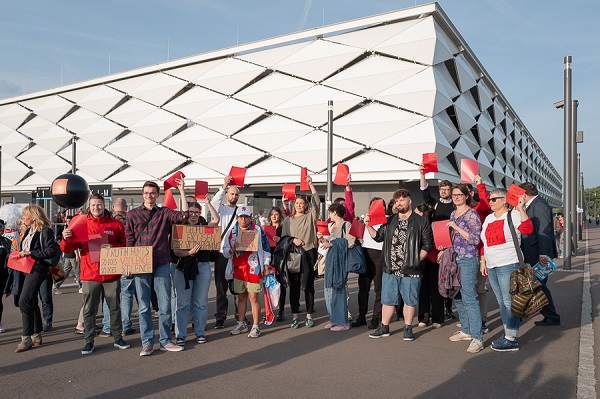 Protest at Luxembourg-Ireland friendly, 10 June 2025;
Credit: Ali Sahib, Chronicle.lu
Protest at Luxembourg-Ireland friendly, 10 June 2025;
Credit: Ali Sahib, Chronicle.lu
A couple of recent friendly football matches raised distinctly unfriendly (yet very important) issues: domestic violence, and the uncomfortable truth that athletic achievement still too often outweighs accountability in sport.
The inclusion of one of Luxembourg’s top footballers in the national squad, and indeed in the starting eleven, despite his recent conviction for domestic violence, has ignited fierce debate in Luxembourg. In my view, it is a conversation that is long overdue - and sadly still necessary in 2025.
In March 2024, professional footballer Gerson Rodrigues was convicted on three counts of assault and battery, including domestic violence against his then-partner, influencer and former Miss Luxembourg Emilie Boland. He received an eighteen-month suspended prison sentence and a €1,500 fine. In April 2025, he lost his appeal against the conviction.
Just weeks later, Rodrigues was selected to play for the Luxembourg men’s national team in friendly matches against Slovenia and Ireland. This decision - made by head coach Luc Holtz and defended by Luxembourg Football Federation (FLF) President Paul Philipp - sparked public outcry. Politicians, activists and ordinary citizens criticised the move, arguing that it sent a dangerously permissive message, undermined efforts to combat it and set a damaging example for young fans.
Luxembourg MP and former professional tennis player Mandy Minella was among those to weigh in on the subject, stating on social media: “A professional athlete has a responsibility not only on the pitch, but also as a role model for children and young people. […] Sport should convey values: respect, fairness and discipline. Anyone who does not represent these values cannot at the same time be a role model for our country”.
Meanwhile, some - notably quieter - voices were putting forward the argument that the plaintiff had been given a second chance by the courts, and he should be able to continue...
The controversy deepened when a journalist from Le Quotidien who criticised the player's inclusion was banned from an FLF press event - a troubling move that raises the question: is press freedom now being shown the red card too?
Protests on the Pitch
On Friday 6 June 2025, during the Luxembourg-Slovenia match at the Stade de Luxembourg, the women’s rights group CID-Fraen an Gender staged a peaceful protest against Rodrigues’ selection. Inside the stadium, activists displayed banners, which were forcibly removed by security officers - one woman was reportedly injured in the process. The FLF later apologised, attributing the “unfortunate” incident to a “lack of coordination” between the federation and security officials.
Further protests took place during the Luxembourg-Ireland match on Tuesday 10 June 2025, attracting attention from Irish as well as local media. Spectators on both sides raised symbolic red cards in solidarity with victims of domestic violence. Among the demonstrators that evening was Emilie Boland herself, who thanked supporters and denounced her abuser’s attempts to discredit her. Her presence was a stark reminder that behind every statistic or headline about abuse is a real person who deserves to be heard.
That same day, Luxembourg’s Minister of Sport, Georges Mischo, announced that the government would suspend part of the FLF’s public funding over its handling of the controversy.
The FLF has defended its stance, claiming that the player had already been punished and deserved a second chance. But second chances in public life come with responsibilities - and consequences. Professional footballers are role models, and they should act accordingly.
Not Just a Luxembourg Issue
This is not just a Luxembourg problem. Around the world, elite athletes are held up as role models - but talent should not shield someone from accountability. Sport does not exist in a vacuum. The decisions taken by coaches, federations and governing bodies send powerful messages about what is tolerated and excused in the name of competition.
Take the case of Steven van de Velde, a Dutch beach volleyball player who competed at the Paris 2024 Summer Olympics. In 2016, van de Velde was convicted of child rape in the United Kingdom and served a prison sentence. His return to international sport triggered public outrage - an online petition calling for his disqualification gathered nearly 100,000 signatures ahead of his first match - and reignited debate over the ethical standards of national Olympic committees.
Another widely publicised case is that of Brock Turner in the United States. The former Standford University swimmer was convicted in 2016 of sexually assaulting an unconscious woman behind a dumpster. Though he faced up to fourteen years in prison, Turner served just three months - a sentence that provoked widespread condemnation and highlighted how athletic “promise” can distort judicial outcomes. The judge cited Turner’s swimming career as a reason for leniency, arguing that a longer sentence might have a “severe impact” on the athlete. But what about the impact of Turner’s actions on his victim?
Sadly, these are not isolated incidents. They reflect a broader cultural failure - one that continues to place talent above accountability and justice.
And this dynamic is not limited to sport. In Leuven, Belgium, a medical student recently received a lenient sentence after sexually assaulting a fellow student - reportedly because of his promising academic future. The implication is the same: that a perpetrator’s potential (often a man’s) is more important than the harm they cause, that their talent or career is valued above their victim’s well-being (or even their life).
Domestic Violence in Luxembourg in Numbers
As reported by Luxembourg’s Ministry of Gender Equality and Diversity in June 2024, the Grand Ducal Police intervened in 1,057 domestic abuse cases in 2023 - an increase of 7.5% compared to the previous year. The public prosecutor’s office at the district courts of Luxembourg and Diekirch received a total of 1,592 such cases (1,266 in Luxembourg and 326 in Diekirch).
The SAVVD assistance service recorded 327 consultations and 3,856 telephone calls linked to 246 expulsions of perpetrators communicated to the service. Meanwhile, Riicht Eraus, a service of the Luxembourg Red Cross working with domestic violence perpetrators to effect change, processed 483 cases in the context of expulsions and other intervention pathways.
Resources for Victims of Violence
To conclude on a hopeful note, support is available and public awareness continues to grow. While high-profile cases such as those mentioned are undoubtedly troubling, they can also help bring attention to this critical issue.
In case of immediate danger, victims are urged to tel: 113 (emergency number). In non-emergency situations, call the violence.lu helpline at tel: 2060-1060 (available every day from 12:00 to 20:00).
In April 2025, Luxembourg inaugurated its first National Centre for Victims of Violence (Centre National pour Victimes de Violences - CNVV). Located near Place de l’Etoile in Luxembourg City, the centre offers confidential outpatient emergency support to adult and child victims of all forms of violence. It provides medical, legal, psychosocial and police services and can refer victims to specialised follow-up services.
Operated by the Luxembourg Red Cross, the centre is open Monday to Thursday from 17:00 to 00:00, Fridays from 18:00 to 02:00, Saturdays from 10:00 to 02:00 and Sundays from 10:00 to 00:00; it can be contacted via email: info.cnvv@croix-rouge.lu or via tel: 2755-5315.
In December 2024, infoMann - actTogether ASBL launched a new support service for male victims of domestic violence: SAVVD infoMann.
Other support organisations include: the Conseil National des Femmes Luxembourgeoises (CNFL), which has a consultation centre; the Victim Support Service (SAV) of the Central Social Assistance Service (SCAS), which operates under the judicial mandate of the State Public Prosecutor; Femmes en Détresse ASBL; La Voix des Survivant(e)s ASBL; Centre Ozanam at Fondation Maison de la Porte Ouverte; the women's consultation centre at Fondation Pro Familia.
Moreover, in the wake of the Rodrigues controversy, the Irish supporters' protest organisers (two individuals based in Luxembourg) have set up a Luxembourg branch of the Ask for Angela scheme, aimed at serving as "a tool to help women feel safer". Ask for Angela originated in the United Kingdom and helps train staff to assist vulnerable people, notably women, when they ask for support if they feel unsafe in bars or other venues.
Help is available, and Luxembourg has legislation in place to protect victims and hold perpetrators accountable. However, it is high time that sports federations took a clear stand and showed domestic abuse the red card as well. Talent and achievement can never excuse harmful behaviour. True progress depends on embedding respect, responsibility and justice not only in courts but also on the pitch and in public life.









